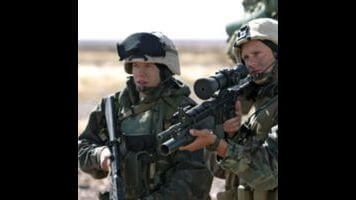Generation Kill: "Combat Jack"

A note on last week’s recap: Some of the commenters felt that I overstated Godfather’s role in mucking things up by pursuing a philosophy of tactical aggression that was self-serving, reckless with regard to the safety of his men, and tragic for the stability and health of innocent Iraqi civilians. I stand by what I said in a broad sense; even though his logic for not allowing a mortally wounded Iraqi boy to get the treatment he need was sound, the decision to push the battalion too deep behind enemy lines was his own. That said, I was definitely wrong in blaming Godfather for the “danger close” fiasco when it was Encino Man who was the chief fuck-up. Godfather’s main problem is that his tactical decisions are questionable; Encino Man, by contrast, is dangerously inept.
The fallout over the “danger close” incident and Trombley’s itchy trigger finger both weighed heavy in tonight’s episode, and led to some interesting developments. I’m hoping some of our commenters with military experience can speak to this a bit, but the episode did a particularly find job of dealing with what Godfather contemptuously refers to as “back channel grumbling.” Soldiers are not supposed to air their grievances with decisions made up the chain of command, but it’s only natural they do so, just as desk jockeys tend to complain about their bosses in the workaday world. But in the military, dissention in the ranks can be poisonous: When orders are questioned or outright flouted, morale goes down and dysfunction creeps in.
And yet the context for Godfather’s speech is infuriating. Not but a couple scenes before, we see a glad-handing Encino Man openly soliciting opinion about how he’s handling his job. He asks them to speak freely; “Forget the stripes,” he says. The men are mostly smart enough to dodge this invitation, because nothing good can come of it, but “Doc” Bryan, who tends to seethe over the mistakes of command, is finally goaded into saying what everyone else is thinking. “Well, sir, it’s just that you’re incompetent, sir,” he says, which is not exactly the constructive criticism that Encino Man was looking for. I’d be surprised if “Doc” didn’t face direct repercussions for telling the truth, but in the meantime, we get a lecture about “back channel grumbling” that follows an incident of grumbling that was devastatingly direct. (And a further indication of Encino’s weakness and incompetence. Can you imagine Godfather ever asking the grunts what they think of his job performance? Not in a million years would that happen.)
Still, with Fick still in trouble over defying Encino’s orders, we get a scene that shows how important it is to keep dissension to a minimum. Here’s a guy who has every reason to be enraged with his betters up the chain of command, but flatly, sternly refuses to abide his underlings’ show of support over the situation. In the middle of a war, Fick understands that you can’t have men openly questioning decisions made up the hierarchy. Ditto Colbert, who faces potential career-wrecking trouble over Trombley’s willful slaughter of an innocent civilian. He’s seriously bummed, no question, but when the threat of an advancing enemy comes down, he snaps out of his catatonia and does his job. (Thus becoming the hero who helpfully points out that those lights approaching 15 clicks in the distance are, in fact, emanating from a stationary town 40 clicks away. Of course, that doesn’t stop 11,000 pounds of bombs to pock the desert like a zit-faced teenager.)
Nevertheless, even Colbert is left shaking his head over an Encino Man speech from later in the episode, when he tries to shift the blame for the materials stolen from the abandoned supply truck from command to the enemy. “It’s the enemy who stole your food from you and you should be really, really mad at them!,” says Encino Man, sounding hilariously reminiscent of a petulant eight-year-old. “I’m reminding you of who your enemy is. The enemy!” And with that goes the last shred of respect anybody might have left for Bravo’s buffoonish captain.
There’s so much to talk about in any given episode of Generation Kill, but since this one is called “Combat Jack”—a term for masturbating in the middle of a combat situation—now is probably a good time to talk about how well the show handles the periods of down time when the Marines are just shooting the shit. Forget about the witty scripted dialogue in the foreground: Listen closely to the soundtrack this week, for example, and you’ll hear a ton of incidental dialogue where soldiers are quoting their favorite lines from The Big Lebowski (“… blacker than a black steer’s tookus on a moonless night.”). Then when we hear some real exchanges, they’re a fascinating mélange of ideas from people from often very different backgrounds, like how a discussion about jacking off to Pocahontas escalates into an argument over the Native American plight (“the genocide of my people turned into a cartoon musical with a singing raccoon”), a reveal of the depths of Trombley’s psychosis, and a devastating critique of racial identity from Colbert. That’s just great writing.

 Keep scrolling for more great stories from A.V. Club.
Keep scrolling for more great stories from A.V. Club.